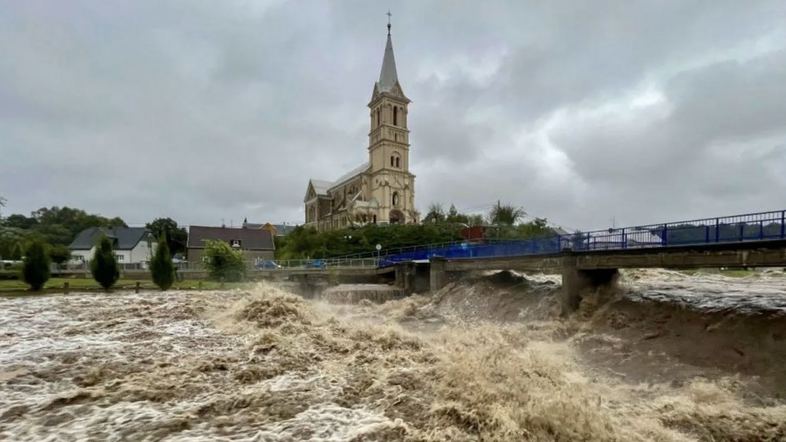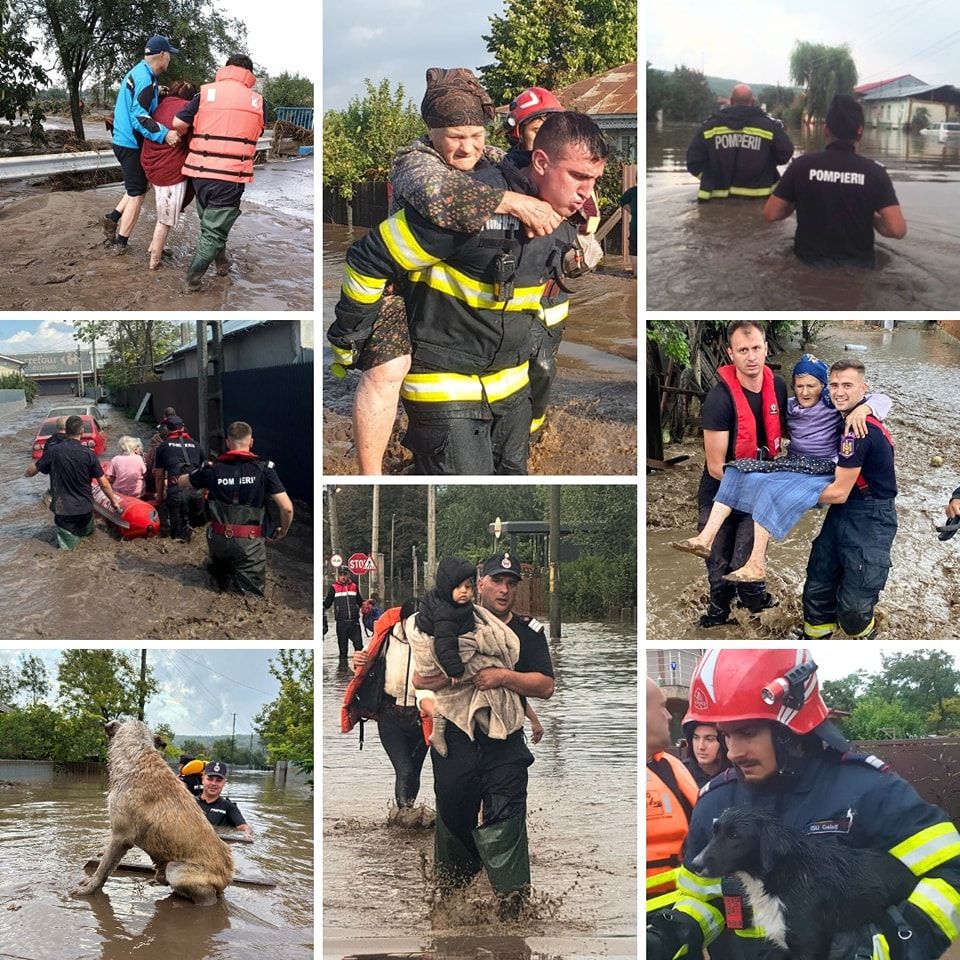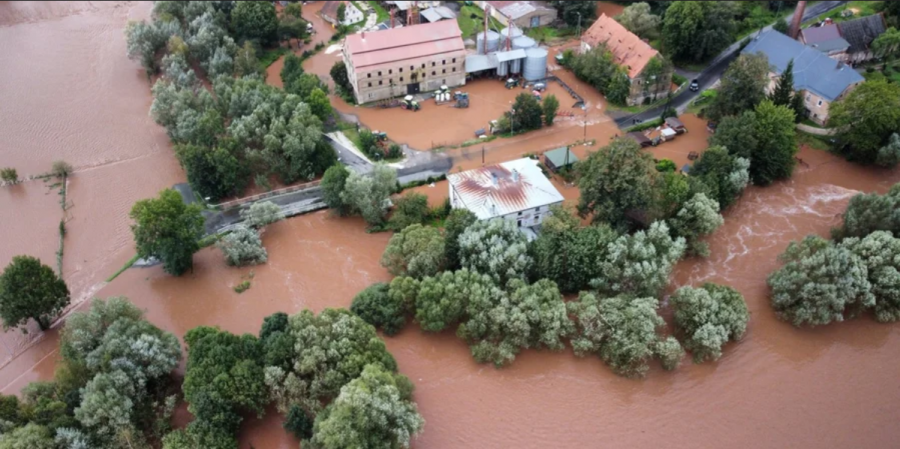The massive floods and downpours experienced by European countries this weekend have caused widespread destruction and at least 17 deaths across the continent.
It is reported by RBC-Ukraine.
News about the most significant consequences of bad weather now comes from 8 countries: Austria, Poland, Czech Republic, Romania, Moldova, Slovakia, Hungary and Germany. In many of them, the authorities were forced to use the army and helicopters to strengthen dams and evacuate residents of flooded settlements. Train traffic between many countries is also paralyzed. Changes in the movement of trains to Europe due to flooding were also reported by Ukrzaliznytsia on Sunday.
The World Weather Forecasting Network, analyzing the causes of extreme flooding in 2021 in Europe, came to the conclusion that the probability and intensity of floods of this type on the continent increases every year due to rapid climate warming.
Austria
In the country, the federal state of Lower Austria suffers the most from bad weather. The situation in the capital Vienna is also tense. The area surrounding it was declared a disaster zone. At the same time, the local authorities assess the situation as "unprecedentedly extreme".
More than 25,000 emergency workers, supported by about 2,400 soldiers, were involved in the disaster response. It is already known about two dead townspeople and a fireman.
The Viennese newspaper Die Kleine Zeitung warns:
"What we are witnessing is the consequences of a changing climate caused by anthropogenic factors. The time has come for those events that scientists once predicted with high accuracy: extreme natural phenomena are becoming more intense and occur more and more often. What used to happen once every hundred years, now happens almost once every decade."
The journalists pointed out that now we are talking about global warming of only 1.4 degrees, and in the worst case scenario, global warming may exceed 4 degrees this century – with all the catastrophic consequences.
"It's up to us: can we turn this trend back – or will we follow those storytellers who still deny both the existence of global warming and its consequences."
Another Austrian publication, Der Standard, despaired stated, that two weeks before the elections, APS, a party that denies anthropogenic climate change, is leading the polls.
"In her election program, she warns against "climate hysteria" and intends to destroy the recent successes of climate policy. The fight against everything supposedly foreign – from immigration to transgender people – in the framework of the election campaign seems to her to be more appropriate than the fight against global warming – despite the deaths of people from heat and hurricanes, despite the destroyed houses, destroyed crops, millions of losses and chaos."
According to the journalists of the publication, the majority of the population has developed political immunity to the climate crisis.
"It seems that washed-out roads are easier to tolerate than a speed limit of 100 km/h on the autobahn," they say.
Poland
In the south-west of the country, the floodwaters of the Byala River destroyed embankments and dams in the cities of Glucolazy and Landek-Zdrój. Thousands of people had to be evacuated.
The city of Kłodzko was badly affected. Its mayor has already declared that the city has "lost the battle" with floods and the situation has become "critical".
The town of Strone-Szłonski in the Lower Silesian Voivodeship was under water due to the breach of the dam on the Moravka River. Due to the natural disaster, the region has become practically inaccessible: currently only emergency services can get there.
The number of dead in Poland has already increased to 5 people.
Video from social networks.
The Polish Gazeta Wyborcza did not hold back its emotions on this occasion:
"Apparently, Polish politicians are not mature enough to go beyond party logic in the face of catastrophic events, to speak less – or even to keep their mouths shut. Kaczyński [PiS] has apparently decided that his voters need constant jabs hatred, with which he regularly feeds them – regardless of the circumstances."
Journalists believe that the politicians of the "Civic Coalition" party are also competing to see who will show the highest level of flooding – and thereby compromise PiS, which during its time in power neglected to build protective structures to prevent floods.

Photo: bbc.co.uk.
Czech Republic
The largest amount of precipitation fell in the country. Some regions received their three-month supply in just 3 days. The situation is worst in the two northeastern regions. The city of Esenyk is completely cut off from the rest of the world, as roads and railway tracks are under water. Most of the city of Opava had to be evacuated.
However, the Prague edition of Hospodářské noviny noted that despite all the damage, the Czech authorities are better able to cope with the catastrophic flood than with similar cataclysms in 1997 and 2002:
"The notification system has been greatly improved. Hydrologists, the country as a whole, regions and communes exchange information quickly and notify citizens in a timely and accurate manner. Of course, mistakes are inevitable, as, for example, in Bohumin, where water arrived twice as fast as expected experts. But what will definitely not happen again is what happened in 2002, when the then mayor of Prague, Ihor Nemets, declared that "the situation is better than anywhere", and a few hours later water was rushing through the tunnels of the Prague metro."
Currently, 1 dead and 7 missing persons are known in the country.
Romania
The Minister of Environmental Protection of the country, Mircea Fechet, told the Associated Press that in some heavily flooded areas, more than 160 liters of rain per square meter fell. m, which, according to him, is a rare phenomenon.
The city of Lypova is inaccessible from all sides. The next wave of flooding is still expected there. More than 5,000 households in 12 towns were affected in Galati County. In some places, the water rose to a level of 1.7 m. Due to the flooding of wells in the region, there is a risk of hepatitis A infection.
The number of flood victims has increased to 6.

Photo: facebook.com/igsu.situatiideurgenta.
Moldova
The Byk River overflowed its banks. Transportation stopped, the Chisinau Theater of Opera and Ballet was flooded. The authorities have declared yellow and orange levels of danger.
Slovakia
A state of emergency was declared in the country's capital, Bratislava, on Saturday. According to forecasts, the water level in the Danube will reach its peak on Tuesday and may even reach 9 m, reports the Bratislava-based Új Szó.
Hungary
The mayor of Budapest, Gergiy Karacson, says that "the biggest flood of the decade is approaching" the Hungarian capital. The authorities are preparing to meet the flood and identify the most dangerous places.
Germany
Compared to other countries, the situation remains relatively calm. So far, Upper Bavaria, Lower Bavaria and Upper Palatinate are the most affected. Here, some streets are flooded, in some places water has filled the basements.
As EcoPolitic previously warned, according to analysts' calculations, climate change can kill 14.5 million people by 2050.
We also told that, according to researchers, climate change is threefold increases the likelihood of extreme forest fires.





